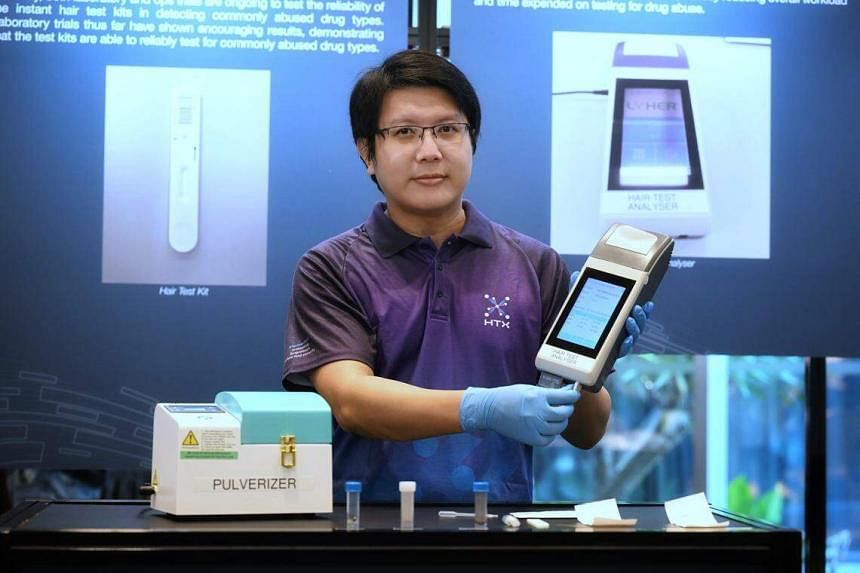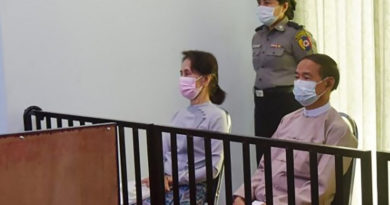ASEAN HEADLINE-DRUGS | More Singapore teens under 16 caught abusing drugs in 2024: Faishal
Minister of State Muhammad Faishal Ibrahim viewing an instant hair test kit, which can almost immediately tell if a person has consumed drugs, at the CNB Workplan Seminar on July 10. ST PHOTO: CHONG JUN LIANG

SINGAPORE – A new drug test kit that provides nearly instant results is being evaluated by the authorities amid a rise in teen drug abuse here.
“In the first four months of 2024 alone, 16 drug offenders who were under the age of 16 were arrested, compared to 24 such arrests in the whole of 2023,” noted Minister of State for Home Affairs and National Development Muhammad Faishal Ibrahim at the Central Narcotics Bureau (CNB) Workplan Seminar 2024 on July 10.
“These trends point to the changing attitudes of some of our youth towards drugs,” he said in his opening address at the seminar on CNB’s anti-drug efforts, noting that among the 600-odd attendees were representatives from the Ministry of Education, anti-drug advocates and volunteers.
Associate Professor Faishal said there have been more cases of youth engaging in drug trafficking and abuse, and that they were getting younger.
He also flagged a wider acceptance of drug use among young people, citing a recent survey where 79 per cent of youth, compared with 91 per cent of adults, agreed that cannabis should remain illegal in Singapore.
Prof Faishal said he thinks “this is largely because our youth are exposed to more misinformation online and from foreign jurisdictions that perpetuate a benign view of drugs, and advocate therefore a more relaxed stance towards drugs”.
Ms Carol Loi, 53, a family coach who attended the seminar held at the Singapore Expo, said that even if children momentarily stray into the world of substance abuse, smoking or vaping, parents should never lose hope but continue to engage them.
“Parents need to get equipped with the relevant information to start conversations with their children on the harms of drug abuse,” the co-founder of SGFamilies, a ground-up movement for parents that organises parent support group discussions, events and talks, told The Straits Times.
The 2022 Health and Lifestyle Survey conducted by the Institute of Mental Health found that the mean age of the start of drug abuse in Singapore was 15.9 years, with many consuming the drugs at home.
Ms Joycelyn Yeo, head of department for student management and leadership at Xinmin Primary School, said the school is trying to prevent pupils from experimenting with drugs.
“Because of (children’s) mobility, peer influence and interaction, and the sharing of information on social media, they might be exposed to smoking, eventually vaping, and these might lead to substance abuse,” she said.
In his address, Prof Faishal also paid tribute to CNB officers, saying: “It is a dangerous and high-risk job, but our officers are clear about their mission to keep Singapore drug-free, and are passionate to be part of this effort and CNB.”
Now there is an instant hair test (IHT) kit, which can almost immediately tell if a person has consumed drugs, instead of the 30 days current methods take, that CNB, the Singapore Prison Service and the Home Team Science and Technology Agency (HTX) are evaluating.

Mr Patrick Gan, a senior forensic scientist at HTX, said a hair sample from a suspect is ground into fine particles, releasing any drug particles from the hair follicles into a solution.
The solution is put into a hair test kit, similar to a Covid-19 test kit, which is then inserted into a portable analyser that is about twice the size of a credit card reader. Drug particles detected will generate a positive result in under 10 minutes.
Mr Gan said the kit is so effective that it would even detect narcotics taken months earlier.
“The drug stays inside our hair and cannot be simply washed off, so don’t bother trying to get rid of it,” he warned. “Just don’t take drugs because the IHT kit will catch you.”
A CNB spokesperson said: “The evaluation is planned to be completed within the second half of 2025.”


 Memento Maxima Digital Marketing
Memento Maxima Digital Marketing







